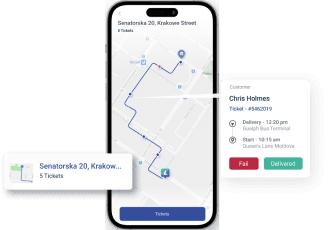TABLE OF CONTENTS

Sign-Up
Enter your email address
While technology has become the main driving force for efficiency, establishing a white label GPS tracking company can be a worthwhile business. Along with the increased demand for vehicle tracking systems in various industries, from logistics companies to personal safety, this field has become ready for exploration. But where do you begin? This guide will take you from start to finish in your GPS tracking business, showing you ways to get over the difficulties that arise.
Understanding the Market Potential
The applications of GPS tracking are quite visible, as well as the data on its importance is highly persuasive. Straits Research comments that the value of the global vehicle tracking system was over USD 21.94 billion back in 2022. It is expected to reach USD 66.96 billion in 2031. It is a signal that the GPS tracking market is moving towards a dramatic growth stage, averaging an annual growth rate of 13.2%.
What is a White Label GPS Tracking Software?
White label GPS tracking software is a product that one company has made and it is another company that has rebranded it. In the same way, you can buy GPS tracking Software from an already existing company like Lumyri but make it unique so your brand can still have it.
Why White Labeling Is the Option?
- Less Initial Financial Requirement: Constructing GPS tracking software from scratch can be very costly as well as a rather long process. The use of white-label software enables you to reduce the asset costs that are associated with starting your business.
- Professional Guidance: Through partnership with organizations such as Lumyri, you gain the advantage of their proficiency in GPS technology which in turn, allows you to strictly concentrate on your marketing strategy and customer acquisition.
- Fast Market Introduction: You can penetrate the market more likely with white-label solutions rather than your own software development thing.
So, is the GPS tracking business profitable? Is it really the food of the season? Definitely! Statista forecasts the GPS tracking market will reach the level of more than $2.4 billion by 2027.
As more and more companies and people are looking for more effective, reliable tracking services. you can get a lion's share of the profits.
Steps to Start Your GPS Tracking Business
Let's go through the core steps necessary to start your white label GPS tracking company.
Step 1: Conduct Market Research
Setting up your own GPS tracking company involves well-versed market investigation which is mandatory. Scrutinize existing competitors, and get to know the target customers and the specific demand in the market. Following are some of the main points you should consider:
- What sectors can use GPS tracking? (e.g., logistics, fleet management, personal safety)
- What extra elements are desired by users of a GPS tracking service?
- Who are your main competitors and what sort of services do they offer?
Step 2: Define Your Business Model
Now that you've done your market research, select your business model. Do they deal with companies that require fleet management or are they interested in individual customers? The way you get to your target clients aids you in the development of your services and pricing plan.
Step 3: Select a Reliable GPS Tracking Software Provider
Finding a reliable option for white label GPS tracking software is very important. You have to partner with a vendor who has:
- Complete GPS tracking features (real-time tracking, geofencing, route optimization)
- Technical support that is extremely strong
- Customization options allow you to be the one who brands the product
Step 4: Develop Your Brand Identity
Developing a unique graphic identity is the key requirement for the GPS tracking business that you offer. Consider:
- Your company logo and name
- A website whose design is professional, the content of which is aimed at the customer
- Marketing tools (handouts, business cards, etc.)
A uniform branding process results in the establishment of the same style that will in turn lead to trust as well as familiarity with prospects.
Step 5: Create a GPS Tracking App
If the question asked is "How do I start my GPS tracking?" your best answer may be diving into the app development process (we will discuss it in the later part). Your mobile application should:
- Provide real-time tracking functionality
- Trigger alerts for deviations from the route or through the unauthorized movement of the vehicle
- Support easy and intuitive user navigation
Without the white-label provider handling the customization, a GPS tracking app can only be built by hiring tech developers.
Step 6: Deploy and Test Your Solution
Carry out dry runs on your system first before rolling out the product completely. Recruit a small sample of users to give opinions on the different functions of the app and their overall experiences. Early signs of success can prevent you from having many painful moments in the future.
Step 7: Marketing Your GPS Tracking Business
Once the foundation is laid, it is necessary to proceed with the process of customer attraction. Below are a few of the obtained solutions:
- Content Marketing: Design and develop blog articles that are informative and add value to the audience. Discussing the scenario where the innovative GPS equipment can prevent unnecessary fuel consumption and consequently, lower the costs, can pique the curiosity of the customers.
- Social Media Engagement: Leverage these tried and tested channels to cover a broader spectrum of customers. Adding more to that, you can publish case studies and the customer's happy stories about the benefits they enjoyed to point out that your services are the best.
- Partnerships and Collaborations: Work with other businesses whose products and services, such as logistic firms, e-commerce companies, and vehicle manufacturers, match your company.
Step 8: Provide Exceptional After-Sales Support
Among the most crucial components of keeping customers in a GPS tracking company is providing them with great customer care. The company’s main advantages include quick response to customers’ inquiries, easy orientation of customers on how to use the app, and rapid solution of technical problems, which assure satisfied customers and potential referrals.
GPS Tracking App Development
If you're thinking of constructing your own GPS tracking app, here are the steps you may need to follow:
- Define the Purpose: What functionalities do you want your app to have? Usually present features are real-time monitoring, geofencing and alerting.
- Select the Technology: Pick up the technologies you use to build your application. Options can be Java or Swift programming languages, as well as mobile app development frameworks.
- Design the User Interface: Come up with a user-friendly design that meets the requirements of your intended consumer. A good user experience is the result of a very basic and neat design.
- Development Phase: Implement the application on the basis of your defined features. The white-label software integration part here becomes essential.
- Testing and Deployment: As a pre-launch requirement, you have to extensively check your software for bugs and errors. The app is all set, now you can place it on platforms like Google Play and the App Store.
- Marketing: Use different marketing strategies to spread the word about your app and gain users.
Conclusion
To start your own white-label GPS tracking company is a potentially beneficial project if you have the correct tactics and understand the market dynamics. Each choice from, selecting a white-label provider like Lumyri, to making a user-friendly app, comes together to your total success. As the GPS tracking market is predicted to have a big growth, it is a good time now to investigate this route.

Aiden mitchell
As a GPS Tech geek, I find Lumyri's transformative impact on GPS technology on businesses and their customers. Real-time tracking information empowers businesses to provide accurate delivery estimates, allowing customers to plan their schedules with precision.



